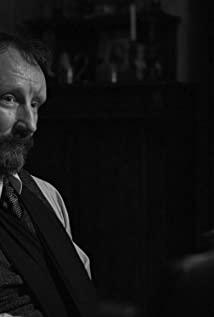Before seeing this movie, if I just guessed from the title, I thought it would be a crime movie or a reasoning movie. Even after watching the first half of the movie, after the scenes where the killer surrendered and the lawyer went to court, I still look forward to it, looking forward to rigorous reasoning, and looking for the truth like a cocoon.
However, I never thought that after a reversal, this movie would become a work about reflecting on World War II, or a movie with real historical events as the background.
Among the countless films about Germans reflecting on World War II, "Innocent Murder: The Colliny Case" may be the most flattering and unexpected one of them. I have to say that the Germans can always find a new perspective in reflecting on the matter of World War II.
After watching the movie, I checked the information and found out that the original movie was adapted from the novel of the same name (The Collini Case). The author of the novel, Ferdinand von Schiller, is a criminal law lawyer practicing in Germany. I have seen many places saying that novels are based on real stories, which is somewhat inaccurate. In fact, the novel itself is based on fictitious creation, and the plot turns in twists and turns, but in the plot the author deliberately incorporates real events in the real world, which is the so-called German judicial Shen Ke-"Dreher Law" (Dreher Law). Law).
The "Dreyer Act" is a law passed in 1968 in Germany. This law stipulates that "Nazi members who committed murder during the Second World War may be considered manslaughter in certain circumstances."
Simply put, this is actually a bill to exonerate war criminals from World War II. Because murder and manslaughter are not only very different in terms of punishment, but more importantly, the prosecution period for manslaughter in Germany is 20 years. After the passage of this law, Nazi members who originally killed during World War II were able to escape legal prosecution.
At first, the bill did not seem to attract the attention of ordinary Germans, but was passed quietly. It wasn't until the novel "The Corinne Case" was published in 2011 that this "draconian law" was introduced into the public eye, and caused a huge social response, which eventually prompted the German Minister of Justice to order a committee to reorganize it. Investigate the trial of related Nazi World War II cases. That's why we say that the novel "The Colinni Case" can be called a reality-changing novel.
And the film "Not Guilty Murder: The Colliny Case" adapted from this novel not only continues with "Dreyer Act" as the core of the story, but also does it in terms of legal aspects, emotional angles, and reflections on the history of World War II. It has a very profound characterization.
First of all, as a film with the theme of law, the spirit of "rule of law" presented in "Innocent Murder" is very admirable. All the characters in the movie, whether we are so-called villains or decent, the original idea is to solve the problem with the law. For example, the murderer Corinne chose to kill his enemies after seeking legal channels to no avail; Mattinge, the lawyer who helped pass the "Dreyer Act", has been fighting for legal matters all his life. He represents the law, and he believes A country ruled by law; the protagonist Ryan, as a fledgling novice lawyer, chooses to defend his "father" enemy because of his respect for the law.
This is exactly how the film has created a strong emotional aspect. The four key roles in the movie, the victim, the suspect, the prosecution lawyer, and the defense lawyer, apart from their different roles in the court, they are also inextricably linked in life.
The victim Hans Meyer, the deceased, was actually the benefactor of the protagonist, Ryan, and a very important elder in his life. As a Turk, Ryan's father left their mother and son at the age of two. If the victim Hansmaier had been gracious during Ryan's childhood, he would never have the opportunity to become a German lawyer. Ryan was caught in an emotional entanglement. He was unable to defend the murderer who killed his benefactor, so he resigned from the court as a defense lawyer.
But the opponent lawyer in this case happened to be Mattinge, a criminal law teacher at Ryan University. He led Ryan as a person who came by, and there will be all kinds of problems in the future, and it is impossible for him to resign and escape every time. Mattinge makes an important statement: If you want to be a defense lawyer, you have to be like a defense lawyer.
This kind of respect for the law so that it may be tainted on human relations and morals is actually very worthy of reflection. In a human society like ours, it is almost impossible.
The final focus is on the reflection on the history of World War II. The most flattering aspect of "Innocent Murder" is that it puts all the twists and suspense of the plot advancement process on a rare pistol-Walther P38 (Walther P38). For those who know a little about weapons, when they see this gun, they will definitely miss the German Nazis.
Although this gun later became a gun for many national armies or police because of its excellent design and stable performance, the almost equated binding relationship between it and the German Nazis is still indelible. After all, the German iron fist and the Nazi favorite have been popular for countless years.
According to statistics, during World War II alone, the number of Walter P-38 semi-automatic pistols produced exceeded one million, and its derivatives continued to serve in the German army after the war until it was gradually adopted by the more modern HK P8 pistol in 1990. Replaced and ended the service life.
In various film and television works, Walter P38 also made the limelight. This is the favorite gun used by Lupin, the protagonist of "Lupin III". The deformed form of Megatron in "Transformers" is a Walter P38 with a folding butt and a scope.
Therefore, the details of "Not Guilty Murder" are indeed very carefully designed. The appearance of P38, and Ryan in his childhood happened to have seen this pistol secretly in Hansmaier’s study, which pushed the stalemate lawsuit in the movie to a new height—to look for history. the truth.
As a result, Ryan followed this gun to track down and uncovered a secret truth that shook the German state, that is, the shame of the German legal profession in 1968-the Raelder Act. Ryan’s benefactor, Hans Meyer, slaughtered civilians in Italy during the 1943-1945 war and was not sanctioned precisely because of this bill.
In fact, a 2013 study on the executions in Campania, Italy found that the Nazis killed up to 22,000 people in Italy. Those executed included mass murdered Jews, prisoners of war and other civilians. Italian civilians accounted for the majority of the deaths. They were usually the targets of the Nazi army's revenge against the guerrillas to resist attacks.
This is exactly the same as what is shown in the movie. When Hansmeier was a Nazi officer, he issued an order to repay the evil with evil: "If one Nazi soldier is killed, ten anti-Nazi guerrilla soldiers will be killed." Make up the number. And Colini's father was one of the countless civilians who were used to make up the numbers.
In the end, Collini worked hard for more than 30 years, and finally killed Hansmaier, smashed his head, and avenged him, but he did not have the slightest happiness. He gave up defending himself, and even chose to commit suicide when the law finally stood on Cullini's side. The death of my father is deeply imprinted in my heart. He was not married and had children to live an ordinary life, and he lived his entire life in revenge. This kind of trauma cannot be repaired.
On the whole, "Not Guilty Murder: Collini" is well laid out and technically stable. There may be many people who think the sociality of this film is great and artistic. From the point of view of the movie, it is true, but its value is that it succinctly cited the case, using the media of video to arouse the attention of the public, and let the society rethink the complicated interest relationship and the law behind the case. The issue of fairness, and all of this is undoubtedly what we, citizens, need to learn now.
For us, movies like "Not Guilty Murder: The Colliny Case" are basically a popular education among Germans about our legal awareness. In particular, the movie chose to end it all with Corinne's suicide, but it undoubtedly left us with a question to think about-if Corinne is not dead, how should the judge decide? This issue is definitely worth thinking about in law.
The so-called justice can only be achieved through fair and open litigation procedures, and we are so far away from litigation procedures, let alone fair and open litigation procedures. So you can imagine how far we are from justice.
View more about The Collini Case reviews











